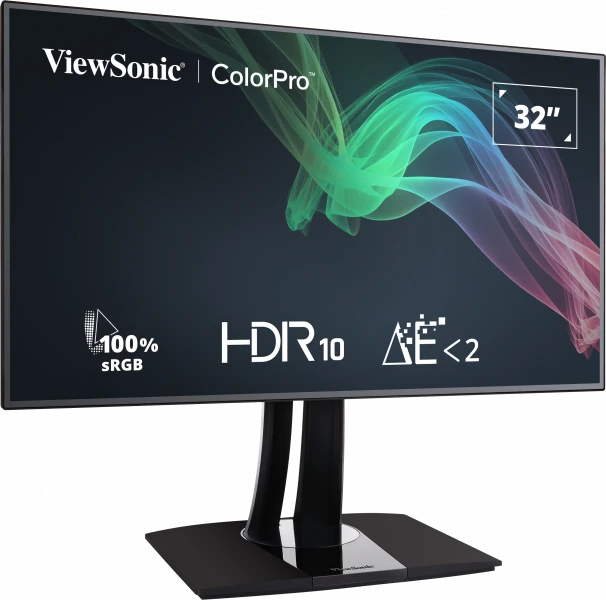
Choosing the best monitor for graphic design directly affects how accurately you see and reproduce colors in your work. Recent Adobe research shows that 79% of creatives say their workload has increased in both quantity and speed demands, intensifying the critical need for pinpoint visual accuracy.
In this article, we’ll explore the key requirements of a good design monitor and highlight ten of the best options available today.
Key Takeaway:
When working in design, photography, or digital art, choosing the right monitor for graphic design is just as crucial as selecting your software or hardware. The following are the essential features and minimum requirements you should look for.
| Feature | Recommended Spec | Why It Matters |
| Resolution and Pixel Density | 4K UHD for 27–32″; QHD for smaller monitors | Ensures sharp details and clean edges for precise design work. |
| Screen Size and Ergonomics | 27–32″ with height, tilt, swivel, and pivot adjustment | Provides ample workspace while supporting comfortable long sessions. |
| Panel Technology | IPS or Enhanced IPS/IPS Black | Offers wide viewing angles and consistent, accurate colors. |
| Color Gamut and Accuracy | 100% sRGB; high Adobe RGB for print; wide DCI-P3 for digital | Delivers true-to-life colors and reliable output across media. |
| Color Depth | At least 8-bit; 10-bit or 8+FRC preferred | Reduces banding and provides smoother gradients. |
| Refresh Rate and Response Time | 60–75Hz for design; 120Hz+ for motion/video | Keeps visuals smooth, especially in animation or video workflows. |
| Connectivity | DisplayPort, HDMI, USB-C/Thunderbolt, hardware calibration | Ensures full-quality signals, flexible setup, and easier calibration. |
| Brightness and Contrast | 350–600 nits brightness; higher contrast for IPS Black | Helps visibility in bright rooms and improves tonal range accuracy. |
Also Read: 10 Graphic Design Best Software for 2025
Finding the best type of monitor for graphic design depends on your needs, whether you are just starting out or already working at a professional level. Below are 10 current examples in 2025 that balance accuracy, features, and cost for different creative workflows.

Dell UltraSharp U2725QE delivers excellent color coverage with nearly full sRGB and DCI-P3 support, combined with low Delta E for accuracy. The IPS Black panel improves contrast while the anti-glare coating ensures clarity.

BenQ PD3225U provides a spacious 32″ IPS Black panel with strong contrast, dual color modes, and hotkey puck controls, designed for professionals handling photography, UI, or motion graphics.

Apple Studio Display delivers extremely high pixel density and near-perfect color calibration out of the box, an excellent option for Mac users who need sharpness and seamless ecosystem integration.

Offering nearly full coverage of sRGB, Rec.709, and DCI-P3, the AOC Graphic Pro U32U3CV is factory calibrated for reliable accuracy. It includes USB-C connectivity, so it is very convenient for modern setups. This monitor is also a strong mid-range choice for professionals seeking large-screen real estate at a competitive price.
Also Read: 10 Best AI Personal Assistant Tools in 2025

This monitor provides strong color accuracy and factory calibration at a more affordable cost. Its IPS panel offers consistent tones and flexible stand adjustments for comfort. It is a monitor suited for students, freelancers, or designers looking for professional quality on a tighter budget.

BenQ PD2706UA (27″ 4K) is compact yet powerful, with excellent sRGB/Rec.709 coverage and factory calibration, a great fit for smaller desks or dual-monitor setups. The product includes an ergonomic stand with height, tilt, and swivel adjustments to improve user comfort, especially for creatives working extended hours.

The ultrawide 34-inch panel provides room for timelines, panels, and multiple windows. Covering 98% of DCI-P3 with a 120Hz refresh rate, it benefits motion design and video editing workflows. A solid pick for multitaskers and UI/UX designers.
Also Read: How to Add Fonts to Figma: A Comprehensive Guide

Well-suited for print and photography work, this 32-inch model comes pre-calibrated with strong uniformity. Its reliability and solid build make it a trusted option in color-critical tasks. Designers focused on image editing will find it dependable for consistent results.

A more budget-friendly monitor, Xiaomi G27Qi covers 99% of the sRGB spectrum and offers a higher refresh rate for versatility. The QHD resolution is sharp enough for entry-level design work.

Philips Brilliance 27E3U7903 offers 218 PPI sharpness, ~99.5% Adobe RGB coverage, and Thunderbolt 4 connectivity. These specs position it as a premium choice for professionals handling high-detail or large-format projects.
Also Read: Ecommerce Landing Page: Key Strategies and 10 Examples
Understanding how to choose a monitor for graphic design ensures that every detail, like color consistency and resolution, is displayed with precision. With the right screen, your creative process becomes smoother, and the final results closely match your vision across print and digital platforms. Investing in a quality monitor is a long-term step toward professional-grade output.
Just as monitors influence visual accuracy, the choice of typefaces defines the personality of your design. Explore curated options like the Creative Display Fonts at Lettermine Studio to complement your high-quality visuals with professional typography. The combination of reliable hardware and thoughtfully selected fonts strengthens the overall impact of your creative work.